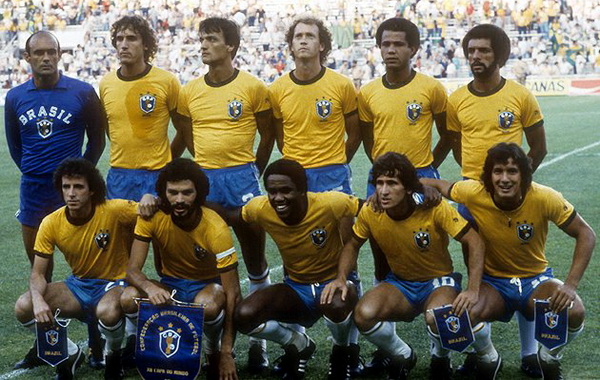🇧🇷 Brazil 1982: The Beautiful Game That Broke Hearts
The 1982 Brazil national football team, despite not winning the World Cup, is often remembered with a sense of wonder, admiration—and a tinge of heartbreak. Their style of play was so fluid, expressive, and joyful that many regard them as one of the greatest teams never to lift the trophy.
🎨 Football as Art
Led by legendary coach Telê Santana, Brazil 1982 was an ensemble of virtuosos who played with rhythm, creativity, and grace. Their football philosophy focused on flair over force, beauty over brute strength.
Key figures in this symphony included:
Sócrates – the cerebral captain whose elegance and coolness defined the midfield.
Zico – nicknamed the “White Pelé,” a playmaker with vision, precision, and a lethal touch.
Falcão – the midfield engine with both defensive awareness and attacking instinct.
Éder, Junior, and Cerezo also added flair and energy to an already glittering side.
⚽ The Campaign
Brazil breezed through the group stage in Spain, dazzling spectators with their attacking brilliance. They scored twelve goals in four games, including breathtaking strikes against the Soviet Union, Scotland, and New Zealand.
But in the quarter-final clash against Italy, Brazil met their tragic undoing. Despite twice leveling the score through Sócrates and Falcão, Paolo Rossi's clinical hat-trick sealed a 3–2 defeat. Brazil’s refusal to play conservatively—even when a draw would have sent them through—defined both their glory and their downfall.
💫 The Legacy
Although they didn’t win, Brazil 1982 became a symbol of football idealism. They showed that style and beauty could captivate as much as silverware. For many fans and historians, this team embodied the essence of jogo bonito—the beautiful game—in its purest form.
Their story is told not through medals but memories, not through records but reverence. Brazil 1982 is a reminder that sometimes, losing beautifully leaves a legacy more enduring than victory.
